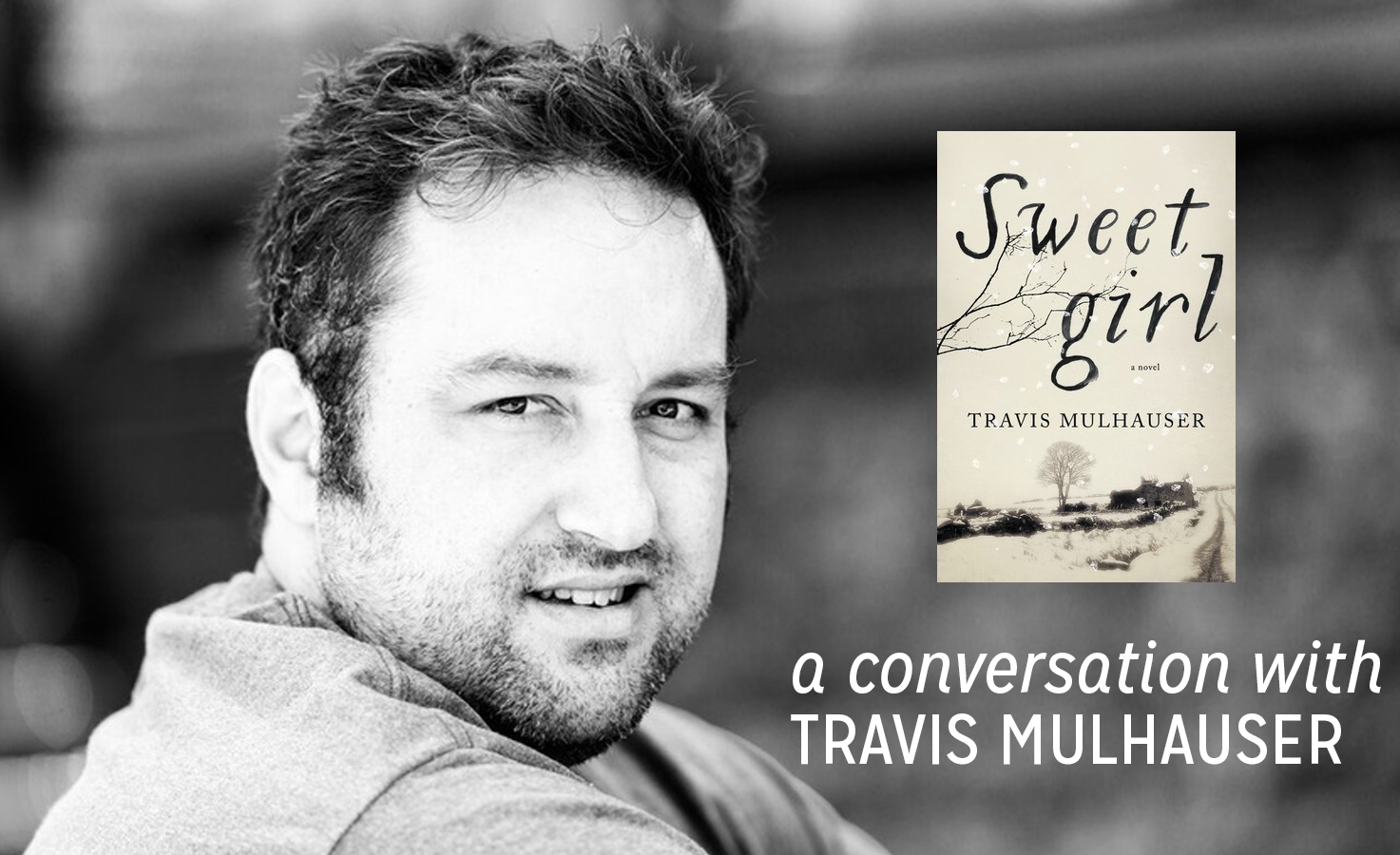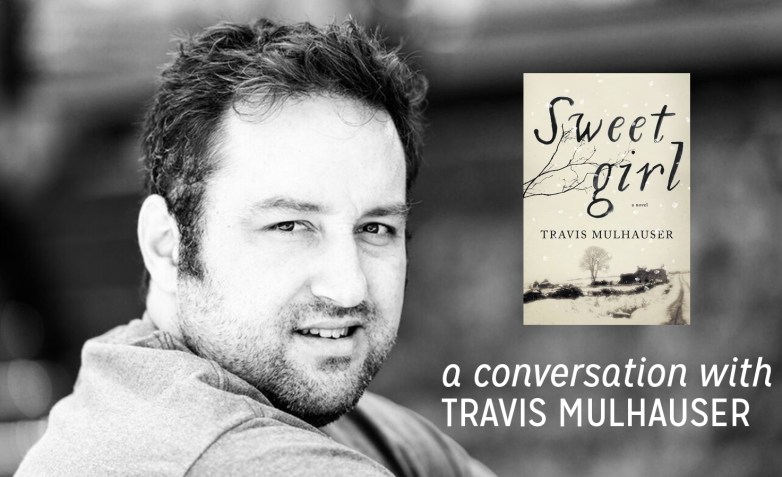Travis Mulhauser’s debut novel may be set in a fictional county in northern Michigan, but Sweetgirl reads very much like an Appalachian or Southern Gothic novel akin to Winter’s Bone. His eloquent prose describes the beauty in the harshness of Cutler County and softens the roughness of his characters.
The novel follows Percy, an intelligent, 16-year-old high school drop out on the search for her meth addicted mother. During the search, she finds an abandoned baby in the care of two passed out drug addicts, which sends the rest of her journey into a melancholy adventure.
What is most striking about Mulhauser is how he became a writer. His style is obviously strongly influenced by his time growing up in Michigan, but unsurprisingly has strong ties to the south due to his time at the University of North Carolina – Greensboro’s MFA program.
I spoke with him about his influences and the fortitude it took to quit the comforts of a forty hour a week job to become a full-time writer.
What struck me most about your book was the beauty of the prose. I want to start by asking where did you get your style? Who influenced you?
I think that that books that I was a fan influenced me. This book Wolf Whistle by a southern writer named Lewis Nordan is about the Emmett Till murder. It’s a fictionalized version, but the way that he wrote his sentences, the way they kind of move from one to the next. It’s the first book that I read where I felt that every sentence mattered. There was no build up. It was like boom. He had this quote about how he would edit his own stuff by going through and taking out anything that didn’t jump off of the page. There was no room for wasted sentences. I sort of liked that take on it. He was also really influenced by the blues, so he would write with a real rhythm. If I modeled my writing after anybody, it would be him.
You just mentioned wasted sentences. How often do you rewrite a passage, a paragraph, a sentence, before you find it to be your own version of perfection?
It’s a lot of whittling down. It’s shameful how much I’ve rewritten paragraphs in Sweetgirl. Some of the paragraphs will stick without too much reworking, but I think a lot of that just ends up being dialogue. When it comes to the paragraphs of description, I revised a lot of that.
I talked to an author recently and they mentioned what the final version of the book ended up being was only one-fifth of what they actually wrote. Did something similar happen to you?
I would say one-fifth is pretty accurate. If not even more extreme than that. I have a database where I will put sections that I cut. It is really just a huge junkyard that kind of goes on forever. I would say that whatever it ended up being, there’s at least three times that didn’t get into the book.
Speaking of cutting things, I read that Percy originally was a minor character in another project, and then you decided she deserved her own spotlight. How did the genesis of Sweetgirl come about?
This sort of goes toward your previous question, and it’s indicative of my process. I’m just always writing and seeing where the characters will take me. You know, Percy popped up in a different project. It had the idea of this girl discovering this abandoned baby, but she wasn’t the central focus. Everything I wrote for that project ended up in that junkyard, but I wanted to write about her.
And then Shelton, the antagonist, I had written about almost without context. I had written his sections previously. I was interested in him as a character, and they just sort of fit together. I had a really non-linear, backward process for this project.
Once you decided Percy was to be the main focus, how long did this process take you?
Once I focused in on Percy, I think it became a normal lifespan of writing a novel. It was probably two years before I sent it out. Maybe a year and a half. A lot of that was writing while having a full-time job plus having two kids. If I would have been locked in a room it wouldn’t have taken that long.
You actually transitioned to something I wanted to talk about a little later, but I’ll ask now. There was an essay that I read on Literary Hub called “The Unemployed Life of a Professional Author.” Do you currently have a 40 hour a week job and then write on the side? Or what is your professional life like now?
No, I quit. I did forever, but I quit.
So what is life like for someone who is published and a professional writer, but you’re not a name like Stephen King. What’s life like for Travis Mulhauser right now?
Weird. It’s surreal. Signing with Ecco was a dream come true. I love them. Then we got some foreign deals, which was extremely unexpected. A lot of my life has changed, but at the same time so much remains the same. My kids, for instance, are pretty unimpressed with me as a writer, but do like it when I talk in funny voices and play Legos. When I told my daughter about the deal with Ecco, this was like two hours after it happened, she looked at me and said, “I want some yogurt.”
How did you come about quitting your day job to become a full-time writer?
I taught community college and was a lecturer at state schools in North Carolina for twelve or so years. These are untenured positions that operate on one-year contracts. I wasn’t a professor. I taught mostly freshmen and sophomores. I loved teaching, actually being in a classroom with students, interacting with them, that part was always a blast for me and I think I was pretty good at it. The parts I wasn’t so good at typically involved meetings and administrators. I left when the book sold, in part because my wife is the salaried bread-winner, we have two small kids, and because academics was starting to drive me a little bit insane. And when I say academics I don’t mean teaching or the students.
What is the daily writing process for you now?
I get to my desk sometime between 7:30 and 9:30 depending on what’s going with the kids and school drop-off times. I write, eat lunch, then come back and write until it’s time to get the kids. During football and basketball season my writing time occasionally falls prey to twitter rabbit-holes and highlight packages.
I was really interested in how your prose and your plot come off as very modern Southern Gothic, yet you set the story in Michigan. Do you consider yourself a Southern writer?
I don’t consider myself a southern writer, because I write almost exclusively about Michigan. But I am heavily, heavily influenced by the Southern Gothic style, and love and admire the literary culture down here.
I love the idea of Cutler County. Why write about a fictional location and not somewhere real?
Cutler County is really closely based on my hometown of Petoskey and the surrounding area. I prefer a fictionalized version for a lot of reasons–one is that I can move the landscape around a little bit to help when logistics require. So there’s a practical element to it. I also think it’s important to leave myself room to invent, invention is why I like to write fiction in the first place, and I wouldn’t want to give up that freedom–I think the truth of a place is a feeling more than a line on a map, and that, ironically, those sort of truths can often be best arrived at, or best conveyed, when certain elements are free to be created and shaped without limitation.
What about your next project? Do you plan on continuing to set stories in the county?
We’re staying in Cutler for the next one too. Too much going on up there to leave right now.


1 Comment